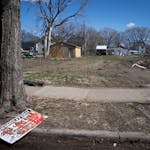Are body cameras working? How well-trained are patrol officers? What can be done to improve public trust in the force and to better combat the city's rising crime?
Minneapolis' new interim police chief, Medaria (Rondo) Arradondo, will face all of those urgent questions as he begins guiding the 800-officer department through one of the most trying times in its history.
Arradondo, 50, succeeds Janeé Harteau, who resigned Friday at the request of Mayor Betsy Hodges amid the uproar over last weekend's shooting death of Justine Damond by a city patrol officer. Damond had called 911 to report a possible sexual assault near her southwest Minneapolis home and was shot when she went out to talk to police.
Arradondo would be the city's first black police chief if he wins the job permanently, which requires the approval of the City Council's Executive Committee.
"He's been on the ground helping us do this work and make these changes over time," said Hodges, whose disagreements with Harteau played out in the public eye.
In a contentious city election year, residents and council members will be watching to see if Arradondo — a 28-year Minneapolis police veteran — can make the dramatic changes being demanded of the department, including less use of force and greater use of body cameras. Rank-and-file officers would like to see a boost in morale. There also is a push for more accountability over officer misconduct and the need to rebuild some neighborhood relationships.
"I think sometimes there has been fear of criticizing the department because it's perceived as not supporting the people who are there every day working to protect our community. And we just need a chief who can articulate that it's both," Council Member Lisa Bender said.
Arradondo, who declined an interview request Saturday, joined the Minneapolis Police Department in 1989 as a patrol officer on the North Side and quickly climbed to leadership positions.
After a stint as head of Internal Affairs, he was named inspector of the First Precinct, seen as a steppingstone to the department's front office. Before being named assistant chief earlier this year, he was Harteau's chief of staff, acting as her intermediary with community and business leaders.
Police Federation President Lt. Bob Kroll, a frequent critic of Harteau, said that he looks forward to working with Arradondo, calling him an "effective communicator."
"I've got great hopes for him," Kroll said. "The officers like him, and he's got knowledge and experience."
The two leaders have a complicated history. Kroll was mentioned in a 2007 discrimination lawsuit brought by Arradondo and four other black officers accusing then-Chief Tim Dolan of creating a racially hostile environment. Kroll says the men have since patched up their differences.
In some ways, Arradondo is expected to continue the work of transforming the department into the 21st-century police force that was started by Harteau, who introduced body cameras and mandated implicit-bias and procedural justice training for all officers. Harteau, who also overhauled the department's use-of-force policy, declined to comment Saturday.
Arradondo will have to balance his new responsibilities with trying to tamp down crime — which, while still near historic lows, has risen in 2017. Violent crimes such as homicide and rape are up about 4 percent compared to this time last year. Property crimes have seen bigger increases in the same period, rising about 20 percent.
Overall, crime has jumped roughly 16 percent, from 10,932 reported incidents in 2016 to 12,717 this year.
Several council members have said they would like Arradondo to hold the interim job until after the November election, allowing the next mayor to choose a chief. At least one council member — Linea Palmisano — has said the next chief should come from outside the department.
The job demands someone "who holds officers accountable, that is a strong communicator and works well with civilian leadership, who is responsive and accessible," said Council Member Andrew Johnson.
Council President Barb Johnson said Arradondo "has been asked over the years to be kind of a peacemaker and does that very well and takes on some very tough tasks."
Of her expectations for the next chief, she said: "I hope that there's a continued direction in improving police-community relations, obviously." She also believes it's time to reevaluate training and hiring practices.
Johnson opposes hiring Harteau's successor from outside the department. "I've never been happy with the results that we've had when we've had chiefs from the outside," she said.
Council Member Alondra Cano suggested the new chief hold quarterly meetings with the council. She said Harteau sought to reform the department but failed to forge deeper relationships to make the reforms succeed.
"It goes above and beyond training," Cano said. "We're not asking the right questions yet. And we're not digging deep to figure out how to turn this around."
Protesters who interrupted Hodges' news conference Friday at City Hall expressed anger at Arradondo's appointment.
"We understand that Chief Arradondo looks like us, but he's not one of us," said longtime activist Mel Reeves, adding that he believes the new chief's loyalty and allegiance will be with the police department and not the community.
Council members will be watching to see how Arradondo navigates the challenges ahead.
"We should not add one dollar to the police department that isn't explicitly about reform, that isn't explicitly about how we're going to change policing," Bender said.
Staff writer Eric Roper contributed to this report.
Libor Jany • 612-673-4064




